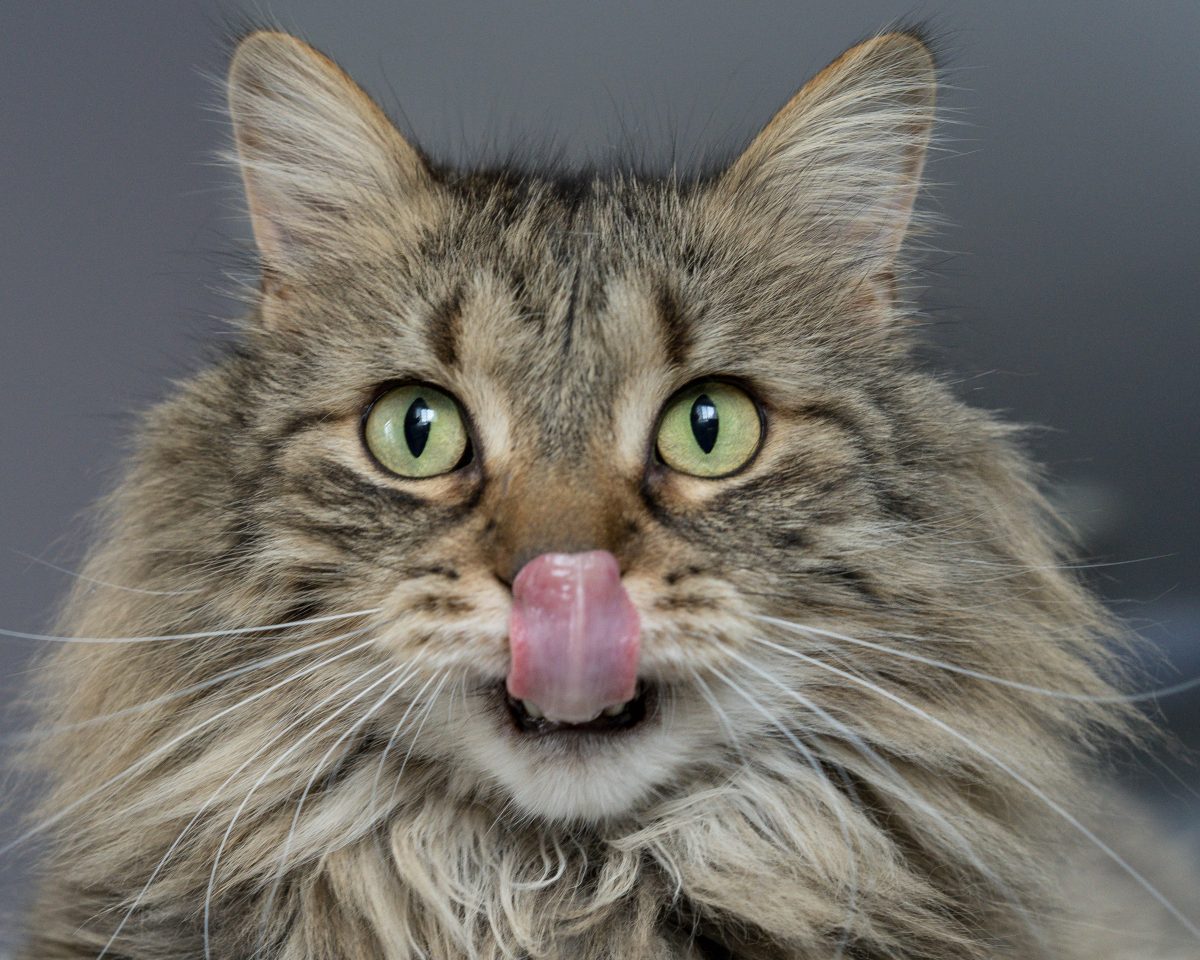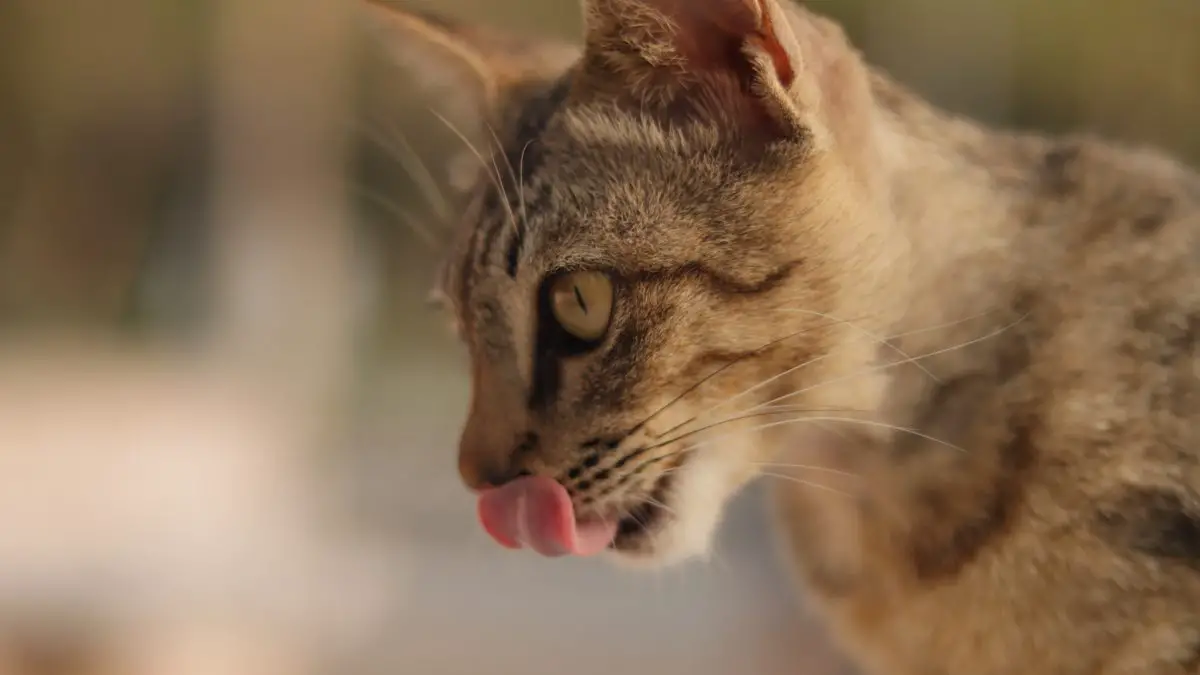Cats are regular and fastidious cleaners, always grooming themselves or others throughout the day. Yet, you may have started to notice something odd about your cat. Did they lick their lips as often as before? Why does your cat keep licking lips and behaving strangely? This isn’t normal behavior and could mean that your cat is in distress or unwell.
There are several factors that might drive a cat to lick its lips all the time. Let’s look at the reasons why a cat keeps licking lips and acting strange. Plus, you will learn some useful tips for what to do if your cat is displaying this behavior.

Table of Contents
About a Cat’s Tongue
Let’s first talk about a cat’s tongue.
Anyone who has had a cat lick them will talk about how strange it feels. This is because cat’s have barbed tongues that are designed to comb through their fur and pull meat from bones. These barbs are also called papillae. However, the papillae can also collect other things that aren’t as delicious, such as debris and dirt. Your cat swallows that indigestible material then often brings it back up as a hairball.
Some foreign objects, however, are difficult to both swallow and get off the tongue. Others can invade the soft tissues. And sometimes, your cat has disorders that cause oral problems. All of this affects them and could cause a cat to keep licking its lips.
Reasons Why a Cat Keeps Licking Lips
If a cat keeps licking lips, it could be either a mild concern or one that requires emergency medical aid. Here are some of the most common causes of cat lip smacking:
1. Grooming or Cleaning
Anyone with experience in owning a cat knows that these animals lick themselves all the time. In fact, cats may spend over 5 hours a day grooming their bodies. That might sound insane, but cats do love keeping themselves clean.
This also pertains to their mouths. After eating, a cat will lick at the corners of their mouth and wipe their face with their paws.
Consider this the first option. Observe your cat throughout the day and see when they start licking their lips the most. You might find that the lip-licking is a result of fur getting stuck on the tongue or leftover food.
2. Oral Disease
Older cats are prone to oral diseases, such as:
- Gingivitis – a bacterial condition that causing swelling and irritation along the gums.
- Periodontitis – a more advanced and severe case of gingivitis that may cause an abscess to form.
- Tooth resorption – a condition that causes tooth loss. 30-70% of house cats suffer from this, and there is currently no known cause.
- Oral tumors – can develop anywhere in the mouth and cause discomfort. Your cat may lick its lips because of the pain caused by the tumor.
Some cats can also have dry mouth, canker sores, or oral ulcers.
Think your cat keeps lip-licking because of oral problems? Schedule a visit with the vet. Once the vet has checked out your cat’s dental health, they should tell you how to begin a tooth-brushing routine for your cat. Another possibility is dental surgery, depending on the extent of the oral disease.
To stay ahead of such issues, it’s important that you are proactive about your cat’s dental health. Dry kibble is great for cleaning their teeth, but if your cat doesn’t like dry food, you should brush their teeth regularly.
3. Your Cat Ate Something Poisonous
When a cat eats something toxic, like Golden Pothos, their mouths immediately react. You might see this behavior and even think, “Why does my cat keep licking his lips and shaking his head?” Well, it’s a sign that the toxic crystals in the plant are beginning to irritate the soft tissues in your cat’s mouth. That, or they tried to lick something unsavory and are beginning to salivate excessively and feel nauseous.
Some plants, like peace lilies, philodendrons, and pothos, are some of the most toxic houseplants for cats around. Make sure that these plants are not within reach if you do have them. Should you notice leaves on the toxic plant are damaged and that your cat keeps licking lips, call the vet.
Other symptoms include:
- Diarrhea
- Breathing difficulties
- Vomiting
- Salivation
- Refusing food and water
- Coma

4. Ptyalism, a Saliva Disorder
If your cat keeps lips smacking without stopping, it could be a sign that they have ptyalism. This condition occurs when the mouth creates an excess of saliva. Alone, this may not seem like a big deal, but it can cause nausea and other health problems in cats. Lip licking tends to happen when cats feel the need to throw up.
If you suspect your cat has ptyalism, look for some of the symptoms. Aside from cat lip licking, you will notice that they drool a little, turn away from food often, and throw up often.
Some health conditions are also related to ptyalism, including:
- Poisoning
- Mouth diseases
- Tooth decay
- Foreign bodies in the throat or mouth
- Rabies
- Allergies
- Nausea
If the ptyalism doesn’t disappear on its own, visiting a vet is your best option. The vet can perform a complete examination and perform a variety of diagnostic tests. Also, make sure there are no poisonous plants in your home. Keep dangerous chemicals and foods out of reach.
5. Nausea
Cat lip smacking can also be a sign of an upset stomach. Lip-licking can be a sign of pain, especially when your cat is on the verge of vomiting. Sometimes the reasons behind their nausea are easy to rule out (like taking medicine they don’t like), while others may be more complex. For instance, cancer, diabetes, and kidney failure all cause nausea in cats, as does chewing on something they weren’t supposed to.
Make sure you schedule an appointment with your veterinarian. In the event the nausea is related to food, you may have to switch up your cat’s diet.
6. Allergies
Does your cat keep licking lips and sneezing? It could be allergies. When a cat’s lips get itchy from eating something they’re allergic to, it could cause irritation around the mouth and nose.
Keep an eye out for other symptoms related to allergies like:
- Skin irritation
- Labored breathing
- Wheezing
- Watery eyes
- Excessive itching
You will need to work alongside a veterinarian to determine the cause behind the allergies. Once you do, the lip-licking problem should clear up.
The End of Lip-Licking
If your cat keeps licking lips over and over to the point where you can no longer ignore it, don’t. Be careful if your cat keeps licking lips and swallowing or shaking their head. While it could mean they are grooming themselves, frequent lip licking is a sign of illness or distress. Don’t wait to see if the condition is going to improve. Pick up the phone and call a trusted veterinarian immediately. Otherwise, the condition of your furry companion may severely or fatally worsen.
FAQs
Excessive lip licking could be a sign that your cat is feeling uneasy or threatened. Cats might lick their lips if they are experiencing digestive discomfort or dehydration. Other reasons might be allergies or dental problems.




